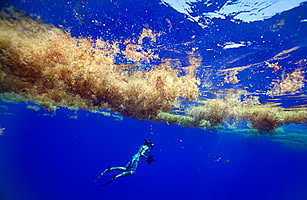
(4 of 4)
Earle, for her part, is an absolutist. She won't eat fish any longer — "I don't eat my dive buddies," she says — and urges others to do the same. When she talks about creating protected areas, she wants true marine sanctuaries, where fishing would be largely off limits, at least for a time. That brings opposition from the fishing industry, which has long been skeptical of the value of MPAs and doubtful that the seas are really in danger of being overfished. That's hard to believe. Fishermen have been able to mask the drop in fish populations only by going farther from shore and going farther down the aquatic food chain while taking advantage of improving subsidies and technology. Eventually they'll run out of room and fish. But MPAs alone, no matter how large, can't save vulnerable areas of the ocean from the impact of warming and, worse, gradual acidification, which will alter the chemistry of the oceans in a way the world hasn't seen for millions of years. "Once you screw with acidification, no one knows what's going to happen," says Tony Knap, executive director of BIOS.
To Earle, however, climate change and its effects are just more reasons to get serious about carving out MPAs. Areas of the ocean with protection are more resilient to nearly all threats than those left undefended. And even fishermen should support the idea of marine reserves. Research from economist Rashid Sumaila found that overfishing leads to global catch losses costing the industry up to $36 billion a year. If the global fish population is a bank account, we're cutting into our principal by overfishing, and we should all know by now that's not sustainable. Creating reserves and giving fish a breather allows the interest to build back up. "You fish less, and you end up catching more," says York University's Roberts.
Bringing Order to the Open Seas
What this means, ultimately, is that we can no longer treat the open ocean as ungoverned space — for our sake (Earle is fond of reminding people that the oxygen in every other breath comes from the ocean) and the sake of all that lives beneath the surface. The good news is that there's evidence of a sea change in attitude. Earlier this summer, the Obama Administration created a federal oceans policy that aims to govern U.S. waters in a comprehensive manner instead of keeping fishing, recreation and energy in separate silos. The National Geographic Society has taken Earle's Mission Blue and built on it, seeking to establish a unified and global ocean-conservation movement. (Earle herself has launched a side group called SEAlliance, which will focus chiefly on MPAs.) Google is getting into the action. After Earle pointed out that the Google Earth application treated the seas as one big blue blank, the company added new functions that allow users to plunge into the deep. The nations of the Pacific, led by the tiny island of Kiribati, are working toward creating the Pacific Oceanscape, a linked, protected area in the middle of the world's biggest body of water. "We need to move beyond our coasts," says President Anote Tong of Kiribati. "The ocean is much larger than any one nation."
The ocean is bigger than all of us, and yet each of us can affect it via our actions. That might be the scariest news of all for the blue. If the oceans are suffering in a world with nearly 7 billion human beings, more than 60% of whom live on or near a coastline, what will happen when there are 9 billion or more? "It's really hard to conjure up much of a sense of well-being, because it just keeps getting worse," said oceanographer Jeremy Jackson — aptly known in science circles as Dr. Doom — in a talk this year.
Think about it too long and it's easy to sink into despair, but Earle floats above — or perhaps below — it. "There is no other planet," she says. "No water anywhere else. We have to save this." If it becomes too much, she can always slip into the sea, where she's spent so much of her life, moving with a balletic grace, in sync with the sea life she loves. On her most recent dive in the Sargasso Sea, Earle drifts past an algae-covered shipwreck, one of scores of vessels claimed by Bermuda's reefs. Seven thousand hours of diving, and every minute beneath the waves still excites her. She lands gently on the seafloor, following the path of a tiny arrow crab, one of the few signs of life in the gorgeous but empty waters. The sediment rises around her, and she disappears in a cloud of underwater dust. She's at home.